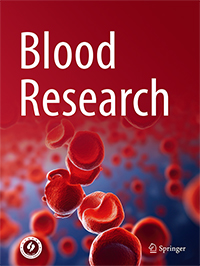Original Article
Korean J Hematol 2006; 41(4):
Published online December 30, 2006
https://doi.org/10.5045/kjh.2006.41.4.282
© The Korean Society of Hematology
Prospective Randomized Comparative Observations of Infectious Complications with or without Antimicrobial Prophylaxis, during Autologous Stem Cell Transplantation
구동허, 고옥배, 김신, 이대호, 김상위, 수철원
울산대학교 의과대학 서울아산병원 내과
Prospective Randomized Comparative Observations of Infectious Complications with or without Antimicrobial Prophylaxis, during Autologous Stem Cell Transplantation
Background: A prospective randomized comparative observation was performed to assess the benefit of prophylactic antimicrobials in autologous stem cell transplantation (ASCT).
Methods:
Forty consecutive patients, with multiple myelomas (MM, 28 patients) or a non-Hodgkin's lymphoma (NHL, 12 patients), were stratified by disease and randomly allocated to receive (prophylaxis group, 21 patients) or not receive (control group, 19 patients) prophylactic antimicrobials. The prophylactic antimicrobials consisted of ciprofloxacin (500mg twice daily p.o.), fluconazole (100mg twice daily p.o.) and acyclovir (400mg every 8 h p.o.), starting 1 day before high-dose chemotherapy (high-dose melphalan for MM and BEAM for NHL), and continuing until neutrophil engraftment or the occurrence of infection.
Results:
At least one episode of fever occurred in 15 of the 19 (79%) patients in the control group, compared with 12 of the 21 (57%) in the prophylaxis group (P=NS). Microbiologically or clinically documented infections occurred in 4 patients (21%) in the control group, but none occurred in the prophylaxis group (P=NS). The documented infections in the control group included 3 staphylococcal bacteremias and 1 herpes skin infection. No deaths, invasive fungal infections or serious adverse events occurred in either group. The median duration of fever (9 days in the control group and 11 days in the prophylaxis group), therapeutic antimicrobial therapy (9 days in the control group and 11 days in the prophylaxis group) and hospital stay after ASCT (19 days in both groups) did not differ between the groups.
Conclusion:
This small-sized prospective randomized comparative observation showed no beneficial effects of antimicrobial prophylaxis in ASCT.
Keywords Autologous stem cell transplantation, Infectious complications, Antimicrobial prophylaxis
Article
Original Article
Korean J Hematol 2006; 41(4): 282-288
Published online December 30, 2006 https://doi.org/10.5045/kjh.2006.41.4.282
Copyright © The Korean Society of Hematology.
Prospective Randomized Comparative Observations of Infectious Complications with or without Antimicrobial Prophylaxis, during Autologous Stem Cell Transplantation
구동허, 고옥배, 김신, 이대호, 김상위, 수철원
울산대학교 의과대학 서울아산병원 내과
Prospective Randomized Comparative Observations of Infectious Complications with or without Antimicrobial Prophylaxis, during Autologous Stem Cell Transplantation
Dong Hoe Koo, Ock Bae Ko, Shin Kim, Dae Ho Lee, Sang We Kim, Cheol won Suh
Department of Internal Medicine, Asan Medical Center, University of Ulsan College of Medicine, Seoul, Korea
Abstract
Background: A prospective randomized comparative observation was performed to assess the benefit of prophylactic antimicrobials in autologous stem cell transplantation (ASCT).
Methods:
Forty consecutive patients, with multiple myelomas (MM, 28 patients) or a non-Hodgkin's lymphoma (NHL, 12 patients), were stratified by disease and randomly allocated to receive (prophylaxis group, 21 patients) or not receive (control group, 19 patients) prophylactic antimicrobials. The prophylactic antimicrobials consisted of ciprofloxacin (500mg twice daily p.o.), fluconazole (100mg twice daily p.o.) and acyclovir (400mg every 8 h p.o.), starting 1 day before high-dose chemotherapy (high-dose melphalan for MM and BEAM for NHL), and continuing until neutrophil engraftment or the occurrence of infection.
Results:
At least one episode of fever occurred in 15 of the 19 (79%) patients in the control group, compared with 12 of the 21 (57%) in the prophylaxis group (P=NS). Microbiologically or clinically documented infections occurred in 4 patients (21%) in the control group, but none occurred in the prophylaxis group (P=NS). The documented infections in the control group included 3 staphylococcal bacteremias and 1 herpes skin infection. No deaths, invasive fungal infections or serious adverse events occurred in either group. The median duration of fever (9 days in the control group and 11 days in the prophylaxis group), therapeutic antimicrobial therapy (9 days in the control group and 11 days in the prophylaxis group) and hospital stay after ASCT (19 days in both groups) did not differ between the groups.
Conclusion:
This small-sized prospective randomized comparative observation showed no beneficial effects of antimicrobial prophylaxis in ASCT.
Keywords: Autologous stem cell transplantation, Infectious complications, Antimicrobial prophylaxis

Article Tools
Stats or Metrics
Related articles in BR
-
Recent advances in the management of primary central nervous system lymphoma
Yoon Seok Choi
Blood Res 2020; 55(S1): S58-S62 -
Busulfan plus melphalan versus high-dose melphalan as conditioning regimens in autologous stem cell transplantation for newly diagnosed multiple myeloma
Ja Min Byun, Jayoun Lee, Sang-Jin Shin, Minjoo Kang, Sung-Soo Yoon, and Youngil Koh
Blood Res 2018; 53(2): 105-109 -
Yttrium-90 ibritumomab tiuxetan plus busulfan, cyclophosphamide, and etoposide (BuCyE) versus BuCyE alone as a conditioning regimen for non-Hodgkin lymphoma
Jae-Cheol Jo, Dok Hyun Yoon, Shin Kim, Jung Sun Park, Chan-Sik Park, Jooryung Huh, Sang-Wook Lee, Jin-Sook Ryu, and Cheolwon Suh
Korean J Hematol 2012; 47(2): 119-125




 PDF
PDF Standard view
Standard view Export citation
Export citation Share
Share  Previous Article
Previous Article



